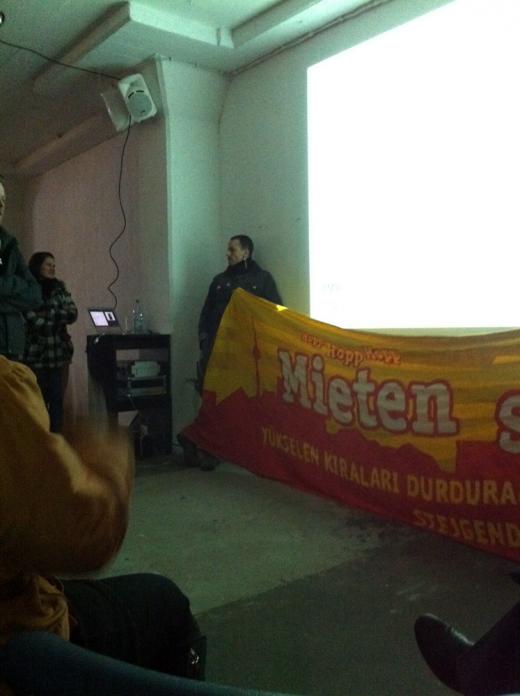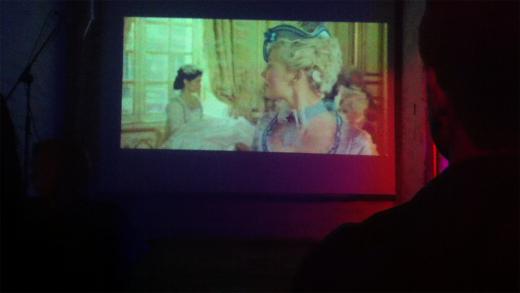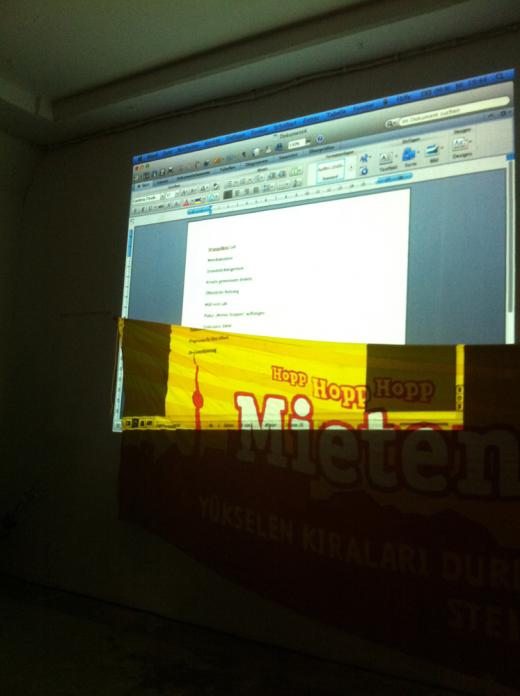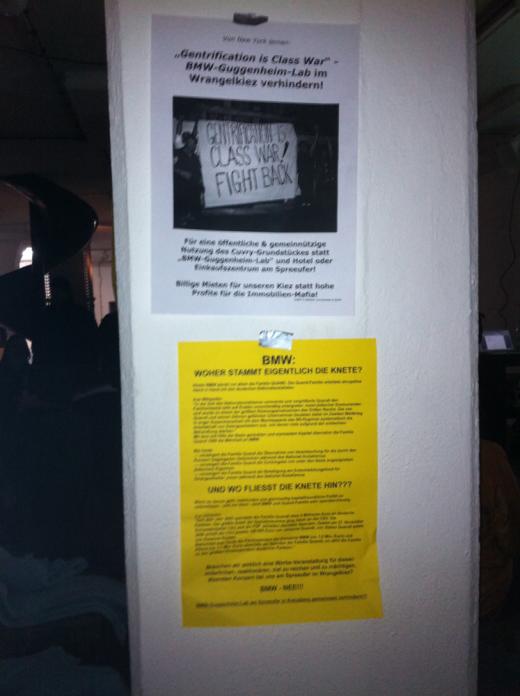Lingua Franca und die Kunstkacke
Lingua Franca und die Kunstkacke
I have been thinking a lot lately about this new language, spoken in art openings and events. It is of course English, or Euro English* but it is also more than that. The main characteristic of this language- lets call it PR Language or Art English, is that nothing means what it says. The surface of the sentence (and it’s meaning as we know it in the English we have learned or natively speak) is often miles away from it’s actual meaning as used in the PR/Art context.
Simple Example: I have been very busy Translates: I have chosen to ignore your calls
More complex example. I quit the gallery to be the co-director of a project space- Translates: I was fired.
Variation: I have decided to explore other options – Translates: I was fired and have no clue what I am doing.
I think this in fact has developed to such an extent that one could start a thesaurus (and I will soon..) I found myself in three discussions last week addressing these exact same issues: the use of language, communication & information platforms, routes (or dead-ends).

Guggenheim Lab in Berlin
One was in the (currently on sabbatical) Artitude space where (director) Lutz Henke tried to inform the invited local people about the Guggenheim Lab project coming up in their neighbourhood in the end of May for 10 weeks. The Lab started in New York in what seemed (in the pictures) like a tiny strip of land between buildings and will travel in the next years in different (key) cities of world: Berlin then Mumbai and so on. As far as Berlin goes, there was a brief consideration of Pfefferberg as a location, but it was then decided to build up the temporary construction in the empty field at the corner of Cuvry str; The one by the Spree opposite Lido, where everybody is grilling illegally in the summer (and where you might or might not find some bio marihuana if you look at the right spot). You might have already noticed, that I avoided calling it the BMW Guggenheim Lab, which is where some, but not all of the problems of this event started.
Surface and Superficiality
@Gitte Bohr-space for art and political thinking
The second event was in West Germany- the place not the country, where the duo of Gitte Bohr- Diego Castro and Eva May (keep meaning to ask them if they are using aliases) organized the first of a series of lecture-events on the theme of Surface and Superficiality**. In a quick paced and well orchestrated line up of speakers the notion of superficiality was discussed on the example of Sophia’s Coppolas movie Marie-Antoinette, a film people love or hate for it’s extended aisthetism. What Gitte Bohr and host speaker Fred Dewey (USA, writer, activist) repeatedly characterised as „violent“ and “dangerous“ is constructing a surface (structure, system, language) with the sole purpose of attracting the viewers (readers) attention and arrest it there, superficially, denying access to the actual information, to the possibility of questioning or thinking.

A relative harmless example is the time we spent virtually biting, poking and throwing sheep at each other in the beginning of facebook, or how much time we (I) spent „touching“ the surface of the iPhone for the mere pleasure of doing it. There is nothing wrong with pleasure of of course, or surfaces (offering overview), without which we would not be able to survive anymore. It becomes problematic when this is used on purpose to manipulate opinions or in the case of arts – it is used to such an extent that it becomes the norm.
What is most interesting to me, and relevant here is language as an impenetrable surface. The use of language in a way, that is actually canceling the purpose of language (which is communication) meant not to inform, but to intimidate. The use of language as non-language. The most evident (and irritating) example of such a language are press releases for art exhibitions.
I am not quite sure how, when or why- this started.
a. out of shrewd notion to imitate the (misguided) principle the art market functions on where: unattainability=value. The less understandable the text is, the more status it obtains, addressing a small (and smaller) intellectual elite.
b. Because of the fact that people writing these texts are rarelly trained to do so, and just as rarely (adequately) paid.
c. Because journalists who (are supposed) to read these texts are just as inadequately paid, which makes the temptation to just copy paste a text which is impossible to understand, just too big. Offering validation to this non use of language and closing in this way the devil’s circle. (pardon- that was directly translated from German-) I meant the vicious circle of nonsense.
d. all this made worse, and this is just the tip of the iceberg, by the fact that these texts are often written and read by non native speakers using English as a common language.
Frieze d/e #4 launch-
This was exactly what the third discussion was about: English as a lingua franca*** in writing about art. Editor in Chief Jennifer Allen, a boy who sat very straight and whose resemblance to a Freaks and Geeks character was uncanny, an Italian guy named Vincenzo who could actually speak very good English (forget French accent- this is the new sexy!), and a very mean girl from NY named something that sounded like Alex (which would make sense/ etymology: "to ward off, to avert, to defend"). I could have looked up the full names and correct titles of course, I just wanted to describe the surface where the (this) viewer’s attention is unintentionally arrested, especially in a talk not so well tuned as this one. (Also a superficial description through which your impression of the event is now filtered)
The most interesting part of the evening was the (all too short) presentations of Alyx Rule’s and David Levine’s research* on the (mis)use of International English on the examples of e-flux press releases. The undoubtful entertainment value of the research was somehow lost, edging at times to irritation of the audience and her fellow panelists, by a slightly judgmental coloration of Rule’s voice and an underlying thesis that English is in fact „polluted“ or suffering from it’s use as lingua franca. She used the term non-English a couple of times, which I believe to be misleading. This might seem like a detail but what Rule is describing is not a problem of the English language (or as far as it is, it is not relevant in the art context). This is a problem of the art community and it’s communication language; the fact that this currently happens to be English is secondary. As far as International or Euro-English is concerned I totally agree with Vincenzo Latronico http://frieze-magazin.de/archiv/features/auf-der-zunge/ that it is not an abomination (my phrasing) but a very alive language in the making.
The audience did not react to Rule’s aggressive tone (as I was reassured from a Californian friend afterwards- this is how they all talk in NY), though judging from their faces, I am sure they wanted to. Maybe if the event was labeled Freeze and not Frieze (a common mistake in art language beginners) they would have. Maybe then Allen would not have to interrupt the talk rather abruptly, because „it is so hot in here!“ No offense, but this is in fact the moment to continue talking...


Die Kunstkacke
It got hot in the Guggenheim Lab event too. What started off in an already negative atmosphere got worse with the power point presentation. I had to double check, as I could have sworn it was in English and that would make no sense in an 90% German speaking audience in Kreuzberg. It was in German but it really felt like English, with program titles like: Confronting Comfort, Beyond Segrification: Models for Equal Glocalization, FeedForward 2: Co-opting Place, Urban Yoga****... People started booing and they were absolutely right. This use of language is common in media circles, (it would not have caused a stir in Pfefferberg, I would have shrugged it away myself) but it is void of meaning, it is constructed only to impress, not to inform. This became very evident in this non-art context, where people just wanted to know how this project would affect their everyday lives. As somebody graphically put: Ich versuche jeden Monat die Miete zu bezahlen und Ihr macht eure Kunstkacke. Two of the present Autonomist group soon spread their own poster over the now abandoned power point screen. It read: Hopp Hopp – Mieten Stopp! I had to look at this for a while, unsure if I should start laughing or crying. Again German that looks and sounds like (some kind of) English. Again a selection of words, whose content (if any) begins and stops (yes it stopps!) within itself. The whole situation was a very graphic presentation of the two polls oppinions are split whenever Berlin’s future comes up – Media People (called here Medien Tussis) against the Autonom/Ost/Queer scene. Both in this case insisting on a superficial language that basically denied any communication. One of the „neutral“ people present, actually started screaming “Inhalte! Inhalte!“. To give the Lab people credit, they promptly abandoned the projection of the now power(less) point presentation, opened a Word document and started writing down the points people were making. I hope this is a start.
Unrelated note: Latronico talked about how non native English speakers used to start a talk with „Please excuse my English“- which was not an apology, as their use of English could in fact have been very good, but an acknowledgement of the fact that their use as non native speakers will differ. This reminded of the time where Americans, first addressed non Americans with the apologetic acknowledgement „I come from my America“, not to admit to any crime of course, but to differentiate themselves from their country's policy. This is in fact still the case in a political context (Fred Dewey in Gitte Bohr did it). This is of course NOT the case in our enlightened art universe, where coming from the USA and particularly NY seems to be a birth right to the divine.
Unrelated note 2: By the way the event invite in Facebook WAS only in English; not in both German and English as Allen insisted. I checked. Point mean girl.
What you see is what you get. 2 halfs of a little baguette, one boiled egg, one cup of cofee for 2,50
-on the way to Salon Populaire
*I prefer the term Euro English to International English because it reminds me of Euro Trash and it is more accurate as it is the influence of European languages to American English we are talking about, we don’t even want to start what the Asian languages will do to it.
**As the Gitte Bohr series unfolds in the next months, superficiality in different social structures, design and architecture will be discussed. Next week also in the form of a blog on bpigs.com
***lingua franca (or working language, bridge language, vehicular language) is a language systematically used to make communication possible between people not sharing a common mother language
****I don't remember the exact program titles for the Berlin Lab, these were taken from the NY program and were very very similar